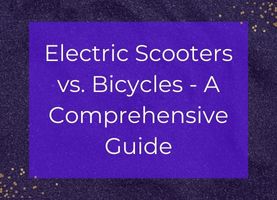
Electric Scooters vs. Bicycles - A Comprehensive Guide
The modern urban landscape is continually evolving, with the need for efficient, sustainable, and flexible modes of transportation becoming increasingly apparent. Amidst this backdrop, the emergence of electric scooters and electric bicycles has sparked a new revolution in personal mobility. These electric vehicles offer a promising solution to the challenges of urban commuting, including traffic congestion, pollution, and the ever-present quest for convenience. As such, the comparison between an electric scooter vs electric bike has become a topic of significant interest for many looking to navigate the complexities of city living with ease and environmental consciousness.
This article aims to delve deep into the nuances of electric scooter or electric bike, providing a comprehensive analysis that covers performance, comfort, cost, maintenance, and environmental impact. The goal is to equip readers with the knowledge to make an informed decision tailored to their personal needs, preferences, and lifestyle. Whether you're considering an electric scooter vs ebike for your daily commute, leisurely rides, or as a step towards a greener mode of transportation, this comparison seeks to address all your queries and considerations.
We encourage readers to explore this article with an open mind, as we dissect the merits and limitations of each option in the electric bike or electric scooter debate. By understanding the key differences and potential applications of these electric vehicles, you can make a choice that not only enhances your mobility but also contributes positively to urban environmental sustainability. Let's embark on this journey of discovery, weighing the electric scooter vs bike to ascertain which electric marvel aligns best with your urban adventure aspirations.

Performance and Speed
When it comes to performance and speed, electric scooters vs. e-bikes present a fascinating comparison. Both modes of transportation offer unique benefits that cater to different needs and preferences.
Electric Scooter
Electric scooters have made a name for themselves as nimble, compact, and highly convenient vehicles for navigating the urban jungle. When considering electric scooter vs electric bike. in terms of performance, scooters generally offer a more accessible entry point for quick, short-distance trips. Their lightweight design facilitates easy maneuvering through city streets, making them an excellent choice for those prioritizing ease of use and agility over speed and distance. However, the electric scooter vs ebike speed comparison often sees scooters at a lower maximum speed, primarily due to their smaller motors and battery capacity, which are optimized for shorter commutes rather than extended travel.
Electric Bicycle
In contrast, electric bicycles (ebikes) provide a robust blend of pedal power augmented by electric assistance, enabling riders to achieve higher speeds and tackle longer distances with less effort. The dual propulsion system of an ebike allows for a versatile commuting experience, adapting to various terrains and inclines with greater efficiency. For individuals comparing ebike vs electric scooter based on performance, ebikes stand out for their ability to maintain consistent speed over more extended periods and distances, offering a compelling advantage for those with longer commutes or a desire for more adventurous explorations beyond the city limits.
In the showdown of electric scooter vs. ebike performance, the choice boils down to personal preference and intended use. E-bikes generally offer higher speed and better performance on varied terrains, making them suitable for longer commutes and challenging routes. Electric scooters, on the other hand, shine in urban environments where agility and ease of navigation are paramount.
Key Features and Benefits
To assist in evaluating the advantages and considerations between electric scooters and electric bikes, the following table organizes key features, benefits, performance aspects, as well as safety and legal considerations of both modes of transport. This comparative analysis aims to provide a comprehensive overview, helping potential users or enthusiasts to make an informed decision based on their personal needs, preferences, and local regulations.
|
Feature/Benefit/Aspect |
Electric Scooters |
Electric Bicycles |
|
Portability |
Highly portable; many models are lightweight and foldable. |
Less portable due to larger size, but some models are foldable. |
|
Ease of Use |
Simple controls and minimal learning curve. |
Requires some cycling skills but is easy to adapt to with electric assist. |
|
Lower Initial Cost |
Generally lower upfront cost. |
Higher initial investment but offers more features and capabilities. |
|
Health Benefits |
Primarily used for commuting; less focus on physical health benefits. |
Promotes physical activity through pedaling; adjustable electric assist for a balanced workout. |
|
Greater Range |
Limited range compared to electric bikes, suitable for short commutes. |
Longer range due to larger batteries and pedal assist; ideal for longer commutes and rides. |
|
Versatility |
Best suited for urban environments and short distances. |
Highly versatile; suitable for a wide range of terrains and purposes, including commuting and off-road adventures. |
|
Performance: Speed |
Generally lower top speeds compared to electric bikes. |
Often have higher top speeds due to more powerful motors and pedal assist. |
|
Performance: Range |
Shorter range due to smaller batteries. |
Greater range, enhanced by pedal assist. |
|
Riding Experience |
Offers a casual, straightforward ride. Ideal for urban trips. |
Provides a traditional cycling experience with the benefit of electric assist; suitable for diverse activities. |
|
Safety Features |
Equipped with lights, reflectors; importance of protective gear like helmets emphasized. |
Similar safety features; helmets and additional protective gear recommended. |
|
Legal Framework: Licensing |
Varies by region; may not require licensing in some areas. |
Typically treated like traditional bicycles, with no licensing required in most regions. |
|
Legal Framework: Insurance |
Legal requirements vary; insurance may not be mandatory. |
Insurance usually not required; depends on local laws. |
|
Area Restrictions |
May face restrictions on sidewalks and pedestrian areas; bike lanes and roads generally permissible. |
Generally allowed on roads and bike lanes; restrictions vary for sidewalks and pedestrian-only areas. |
Both electric scooters and electric bikes offer unique advantages that cater to different preferences and requirements. Electric scooters stand out for their portability, ease of use, and affordability, making them an excellent choice for short urban commutes. Electric bikes, on the other hand, offer health benefits, greater range, and versatility, suitable for a wide variety of terrains and longer distances. When choosing between the two, it's essential to consider personal needs, the local legal framework, and safety practices. Ultimately, both modes of transport represent efficient, environmentally friendly alternatives to traditional vehicles, contributing to the reduction of carbon footprint and promoting sustainable urban mobility.
Comfort and Usability
Electric scooters are synonymous with convenience. Their design is inherently user-friendly, with a straightforward operation that appeals to riders of all ages and skill levels. The electric scooter vs bike debate often highlights the scooter's portability and ease of storage as significant benefits, particularly for those with limited space or the need to combine multiple modes of transportation. However, the standing position on most scooters may offer less comfort during longer rides compared to seated vehicles, which is an essential factor to consider for users prioritizing comfort over compactness.
Electric bicycles offer a comfortable, familiar feel to those accustomed to traditional cycling, with the added advantage of electric assistance to ease the physical strain. The seated position of an ebike provides inherent stability and comfort, making it suitable for longer journeys. Additionally, many ebikes are equipped with features like suspension forks and padded seats, enhancing the comfort level even further. When debating electric scooter vs electric bicycle based on usability, ebikes also offer the versatility of being pedaled without electric assistance, allowing for a seamless transition between manual and electric modes depending on the rider's preference and battery life.
Cost and Maintenance
The initial cost and ongoing maintenance are crucial factors in the electric scooter or electric bike decision. Electric scooters typically boast a lower entry price and simpler mechanics, which can translate to lower maintenance costs and less complexity in repairs. This makes scooters an attractive option for budget-conscious individuals or those seeking a low-maintenance vehicle.
Conversely, electric bicycles, with their more complex components and larger batteries, often come with a higher upfront cost. The electric bike or electric scooter maintenance comparison further reveals that ebikes may require more frequent servicing, especially for components like the drivetrain and brakes, which are subject to wear from both electric and manual use. However, the durability and extended range of ebikes can provide greater value over time, making them a worthwhile investment for serious commuters and cycling enthusiasts.
Environmental Impact
In the green transportation hierarchy, both electric scooters and bicycles rank highly for their minimal environmental footprint, especially when compared to traditional gasoline-powered vehicles. The electric scooter vs electric bicycle environmental comparison largely depends on the specific models and how they are used. Generally, both options contribute positively to reducing carbon emissions and traffic congestion, making them excellent choices for eco-conscious individuals. The key difference may lie in the range and efficiency of each vehicle, with ebikes potentially offering more extensive use per charge, thereby maximizing the environmental benefits of electric propulsion for longer distances.
The debate between an electric scooter vs electric bike encapsulates a broader discussion about the future of urban mobility. Both options present compelling advantages, from the electric scooter's unmatched convenience and simplicity to the electric bicycle's superior comfort and performance over longer distances. Ultimately, the decision boils down to personal preferences, commuting needs, and environmental considerations.
As cities continue to grow and evolve, the importance of sustainable, efficient, and versatile transportation solutions becomes increasingly clear. Whether you lean towards an electric scooter or electric bike, the choice to embrace electric mobility is a step forward in the journey towards a more accessible, cleaner, and smarter urban environment. By carefully weighing the factors discussed, readers can make an informed decision that aligns with their lifestyle, enhances their commuting experience, and contributes to the global effort towards sustainable living.
FAQs
Is electric bike better than electric scooter?
Whether an electric bike is better than an electric scooter depends on individual needs: e-bikes offer greater range and health benefits, while e-scooters excel in portability and ease of use.
What is better bicycle or scooter?
Choosing between a bicycle and a scooter depends on the user's preferences for physical activity (bicycles) versus convenience and ease of use (scooters).
Follow Us
Trending Articles
Newsletter
Aliqu justo et labore at eirmod justo sea erat diam dolor diam vero kasd



